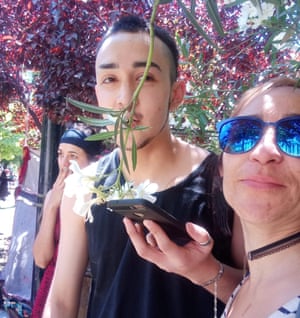“‘Our children are going to prison’: Chile holds scores of minors arrested during protests”, The Guardian
Sophia Boddenberg and Charis McGowan, Santiago, 2 Mar 2020
Many Chilean minors have been detained since the protests began, in a youth justice system rife with cruelty and abuse
More than 180 children in Chile have been held in preventive detention – some for up to four months – for their participation in the wave of social unrest which have rocked the country since October.
Tens of thousands of people have been arrested since protests over rising metro fares spiraled into nationwide demonstrations against inequality. Violent clashes between police and protesters have left 445 people with eye injuries from police shotguns – 34 have permanently lost sight. More than 30 people have died.
Figures from Chile’s penal ombudsman show that 4,080 minors were arrested between October and December, 186 of whom were then put in preventive detention.
Damian Toro, 17, was arrested on 21 October for throwing a molotov cocktail at police officers.
Prosecutors have refused to release him to house arrest before his trial in April, on the grounds that he is a threat to society, but his mother, Cristina Navarrete, insists his actions caused no injuries or damages.
Navarrete, a former factory worker who lives in the Quilicura suburb of Santiago, said her son – who had hoped to go to university but could not afford the fees – acted out of anger at the country’s gaping inequality.
“There is so much injustice in our country. He is part of the generation that wants change,” said Navarette.
Chile’s juvenile detention centres and orphanages are run by the National Youth Service (Sename), which has been criticised by Human Rights Watch and the UN for conditions which have left children dead, abused and violated.

A damming report by the national investigative police found that sexual abuse against detained minors has been recorded in 50% of Sename centres, while 88% of Sename detainees reported physical or sexual abuse and mistreatment.
In January the Senate approved a proposal to close down Sename and reform the juvenile care and detention system, but the changes could take years to complete.
Alexis Aguirre, a lawyer for the National Institute of Human Rights (INDH), has investigated cases of minors abused while being held in Sename institutions after participating in the protests.
“When a child is subjected to cruel and inhuman treatment, you generate irreparable psychological damage,” he said.
“The state should adopt all measures to promote physical and psychological recuperation and help the social reintegration of all vulnerable children,” he said.
Claudette Medina, head of communications at Sename, said that any abuse of minors detained since October had not occurred in their detention centres.
“The human rights violations have been perpetrated by other agents of the state, such as police forces.”
She said that the Sename has worked with organizations such as the INDH and Unicef to ensure the wellbeing of detained minors.
Sofía Arévalo, 17, was arrested on 5 November, over an incident involving a burning rubbish bag which was dropped next to a municipal building in the suburban town of Buin.
No damage was caused to the property, but prosecutors allege that Sofía told others to light the bag on fire, and have accused her of being an “intellectual author” of potentially fatal arson attack.
Sofía’s school teacher, Katherine Hernández, described the charges as ludicrous.
“How can you say a person is dangerous if you’re not even sure that they were involved in the attack?” she said.
After 70 days in the Sename, and three failed appeals, Sofía was eventually granted house arrest on 22 January.
Her trial is set for the end of March. She could face up to three years in the Sename.
“She’s scared – we’re all scared as we don’t know how this could end,” said Hernandez, adding that Sofia is not the same person as she was before her detention. “They changed her.”
Damian Toro is currently waiting for his fifth appeal for house arrest. Navarette said he is hopeful, but she is wary of getting her hopes up.
“He is being punished for going to a protest,” she said, breaking into tears. “Our children are in prison.”